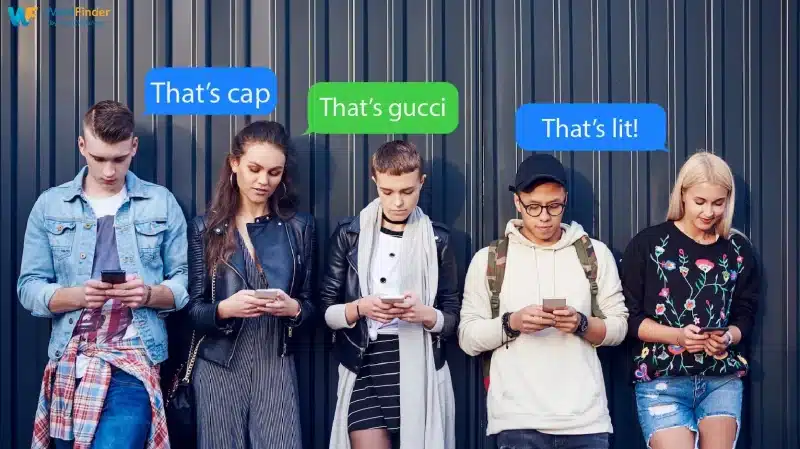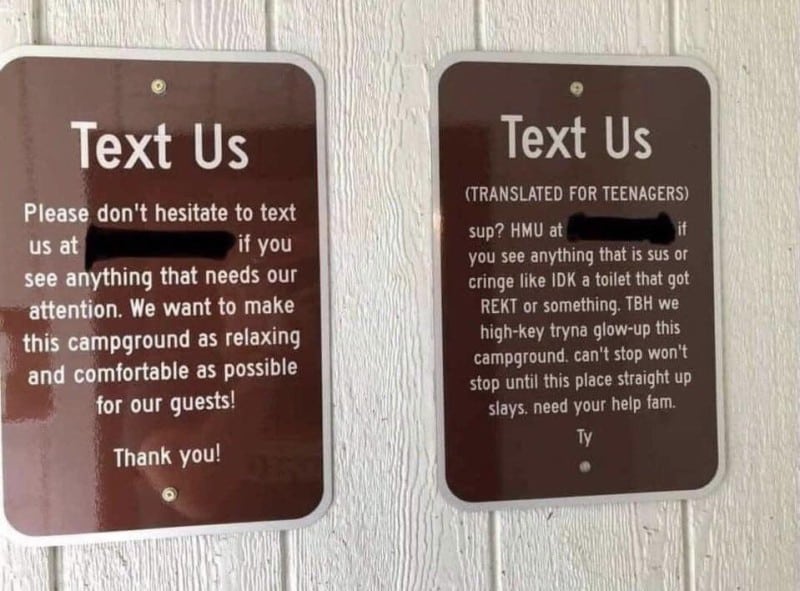
So there’s a meme making the rounds about Gen-Z / texting slang that’s worth some study if you want to create powerfully persuasive advertising. Check it:

As you know “stuff” is inevitably lost in translation.
But in a great translation, important “stuff” is also added to the mix.
So what’s lost in translating from adult / corporate speak to teenage?
And, most importantly, what’s added?
What’s lost is formality. And not the good kind.
We’re not talking about the high formality of solemn occasions and deep rituals.
We’re talking about the bullshit formality of corporate speak. That’s totally ditched in the translation to teenager.
So what’s gained?
- Personality.
- Attitude.
- Emotion.
- Vulnerability, and
- Real Perspective.
In other words, EVERYTHING that matters when it comes to distinguishing your ads and brand from the background clutter.
Look past the slang to see the attitude, emotion, and perspective embodied in this way of speaking.
The lack of caps and opening “sup?” are meant to convey the casual, friendly familiarity of equals. The person writing this doesn’t take herself too seriously.
Moreover, she implicitly recognizes that she’s asking the reader for a favor with her plea to “Hook Me Up at [phone number] by pointing out anything that’s “sus.”
A sentiment that’s echoed with the admission of “need your help fam” as the sign-off. Note the no-BS vulnerability of this phrasing.
Now compare this to the rather distant and bland “Please don’t hesitate…” opening of the adult sign, which automatically puts the reader at a remove, and then pretends that the writer is offering to do the reader a favor should the reader be responsible enough to report “anything that needs our attention.”
Note also how the teenage translation provides concrete examples: “like IDK a toilet that got REKT or something.”
Most important is the unabashed, vulnerable willingness to admit to big goals.
Contrast “We want to make this campground as relaxing and comfortable as possible” with “TBH we high-key tryna glow-up this campground. can’t stop, won’t stop until this place straight up slays.”
What Kind of Language Is In Your Ads?
Are your ads using language that conveys personality, attitude, vulnerability, and perspective?
Are you presuming an intimate familiarity with the audience?
Or are you insisting on an awkward formality?
[Hint, if you introduce yourself in every ad, you’re inadvertently insisting on an awkward formality]
Do you use the casual language of close friends?
Or do you use the artificial language of corporate-speak?
Do you have a recognizable attitude towards your profession and your customers?
Do you have an articulable “advocated position”?
Do your ads have personality? And recognizable branded chunks?
In other words, are your ads closer to the teenager version of the sign?
Or are your ads imitating the blah-blah-blah of the adult sign?
If you’re not happy with your answer to these questions, why not change that with a little help from like-minded friends in the ad business?
- Getting a Foot in the Door — Of Perception - November 27, 2025
- What Digital Superstars Know About Offline Advertising - November 17, 2025
- Unmistakable: A Tale of Two Boots and Branding Done Right - November 8, 2025
